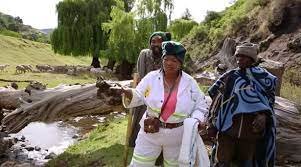Famo Music and Gang Violence in Lesotho
by Vennisa Owusu-Barfi
African music, like every aspect of African culture, embodies the deep connections between individuals of African descent and their roots. Throughout history, music primarily played a sacred role, connecting the listeners to African spirituality and religion. However in recent times, African music has developed beyond spirituality to become a modernized and commercialized tool of self-expression and creativity among Africans. From the development of Highlife in Ghana to Afrobeat in Nigeria to Soukous in the DRC, our music has evolved and integrated different styles of music to create a uniquely African sound.
Source: https://www.musicinafrica.net
However, the power and influence of music can be both a blessing and a curse. It used to help cope with hard times, and in some cases, lift whole communities out of poverty or it can sometimes be wielded by some to perpetuate violence and generational poverty in already deeply hurting communities. One great example is the evolution of Famo music in Lesotho and how it has grown into a weapon of gang violence, contributing to its record sixth highest homicide rate in the world.1
Source: worldyriseblogstop.com
Famo originated among Basotho migrant workers in South African mines in the early 1920s as a way to pass time and relax after backbreaking work in the mines. Originally beginning as a form of work song, it developed into a unique genre accompanied by instruments like the accordion and concertina (with the accordion being more favored by performers due to its larger sound). Like most genres of African music, it employs a call-and-response approach with a lead singer, chorus and ensemble of instrumentalists. By the turn of the 20th century, many foreign recording companies turned to African music as a means of commercializing and monopolizing an otherwise ignored market which led to Famo rapidly developing into a large scale and profitable genre of music.
However, this rapid commercialization and development of Famo led to the creation of rival gangs in communities in Lesotho to capitalize on these gains. Though most of these rivalries occurred within the industry with gangs verbally attacking each other in an almost diss-track-like manner, many of these eventually ended up in actual violent attacks.
Ramainoane, a veteran Famo singer described the situation in a recent BBC article as follows:
"They come to a house looking for you - and you are not there. And they kill the wife, they kill the children, eliminate everybody in the family. Villages and villages are orphanages, because of Famo music." 2
She describes in deep detail the devastation in her community due to rival gangs striving for supremacy in a very competitive market. Though profitable, the industry faces a very common problem faced by African artists due to the lack of legal and industry-led frameworks to ensure musicians benefit monetarily from their work. With relatively lax piracy laws and poor enforcement, many artists across the continent struggle to live off their trade. 3
Source: Daily Star UK
Famo music is a unique and expressive representation of the beauty and culture of the people of Lesotho. This is evident by its rapid commercialization and popularity across Southern Africa and other parts of the world. However, it has quickly developed into an economic and social problem in Lesotho affecting the lives of thousands of people in bloody gang violence.
You can read more on Lesotho and Famo here:
https://www.visitlesotho.travel - Travel and Tourism in Lesotho
https://www.musicinafrica.net/magazine/famo-music-lesotho - Article on Famo Music
https://www.youtube.com/watch?v=UBzWDC9rnJc - Example of Traditional Famo Music
https://www.youtube.com/watch?v=5W3irvqYTrI - Example of Modern Famo Music (Fusion of Famo and Hip Hop)
Sources:
Guardian News and Media. (2021, September 1). Lesotho murder rate ranked sixth worst in world as judicial system breaks down. The Guardian. Retrieved May 19, 2022, from https://www.theguardian.com/global-development/2021/sep/01/lesotho-rate-ranked-sixth-worst-in-world-as-judicial-system-breaks-down
The Vacaville reporter. The Vacaville Reporter. (n.d.). Retrieved May 19, 2022, from https://www.thereporter.com/
Whewell, T. (2022, April 28). The deadly accordion wars of Lesotho. BBC News. Retrieved May 19, 2022, from https://www.bbc.com/news/world-africa-61097386


